SPRING SCENES: This is the first tulip we’ve seen this year, a sure sign (with all of the pesky pollen) that spring is on the way. While rain seems to be the order for the week, it has some benefits — such as cleaning all of the pollen from the air. Click here to see pollen photos by Charleston residents Cynthia Bledsoe and Michael Kaynard.
IN THIS EDITION (MARCH 23, 2015 | Number 7.21)
FOCUS: Program offers “engaging” summer camps
BRACK: A vaccine that saves women’s lives
GOOD NEWS: Dress up, but don’t wear spaghetti, more
IN THE SPOTLIGHT: Magnolia Plantation and Gardens
FEEDBACK: Uncle Bubba
CALENDAR: Cooper River Bridge Run, Cajun Fest, more
PHOTOS: Spring scenes
MYSTERY PHOTO: A bridge with a view
S.C. ENCYCLOPEDIA: Georgia Harris, Catawba potter
FOCUS
STEAM program engages youths at camps
By Robin Berlinsky, Special to Charleston Currents
MARCH 23, 2015 — Eight years ago, the Charleston County School District saw a need for arts-integration support in its schools so it reached out to a non-profit in Dallas, Texas, called Big Thought. The district gathered community leaders, educators and government agencies together to work with Big Thought to create a similar program here in Charleston.
 In January 2013, Engaging Creative Minds (ECM) launched our arts-integration program in eight schools. And here’s what we have accomplished in under two years:
In January 2013, Engaging Creative Minds (ECM) launched our arts-integration program in eight schools. And here’s what we have accomplished in under two years:
- We provide students in grades 3 to 8 with arts-integration experiences that promote creative design, collaboration and problem-solving skills.
- We’ve expanded from eight elementary schools to 13 elementary and 3 middle schools.
- We serve more than 5,000 students and 250 teachers.
- We train and then employ a roster of more than 50 artists to work with teachers.
- An external researcher evaluated ECM’s program, specifically the six traits of effective teaching, and reported significant increases across all six.
By adding the arts back into the classroom, we are helping students achieve 21st century workforce skills.
 The school district looked at our success during the school year and asked for a continuation of that program to address summer learning loss. In his book, Expanding Minds and Opportunities, Dr. Terry Peterson states that turning non-school hours into “learning hours” requires us to provide learning opportunities that address a broader spectrum of interests and talents possessed by today’s youth.
The school district looked at our success during the school year and asked for a continuation of that program to address summer learning loss. In his book, Expanding Minds and Opportunities, Dr. Terry Peterson states that turning non-school hours into “learning hours” requires us to provide learning opportunities that address a broader spectrum of interests and talents possessed by today’s youth.
According to a study by the University of California at Irvine, participating in high-quality summer programs leads to improvements in standardized test scores, improvement in students’ social skills and students who attend summer programs are less likely to participate in negative behaviors. So we created the Summer STEAM Institute. [STEAM stands for Science, Technology, Engineering, Arts and Math.]
There may be other summer camp programs in Charleston, but not like STEAM. ECM’s Summer STEAM Institute is designed for creative and energetic students in grades 3 to 8 who want to spend their summer engaged in unique learning experiences that foster creativity to solve real world challenges alongside local artists, cultural organizations and professionals in the fields of science, technology, engineering, art and mathematics.
Our small group size of one certified teacher per five to eight students offers a highly-individualized learning program including personalized instruction and daily Genius Hours in which students explore and research topics of interest to them. Each week, students work with five ECM Partners (artists, cultural organizations, and STEM professionals) who focus on a different theme from botany to engineering. Arts-integrated activities and student/teacher relationships engage and motivate students, challenge them academically and build their collaboration skills.
How do we know it’s working? We measure the effectiveness of Summer STEAM by comparing standardized test scores from the spring of the previous school year to the fall of the next year. Sixty-three percent of the test scores of the students attending the 2014 Summer STEAM Institute increased! But standardized tests aren’t the only way to measure success. One parent noted, “I was so delighted with the diversity of students, the energy of the teachers, and creativity of the program. It worked!”
ECM’s STEAM Institute is also a professional development workshop for teachers and professional artists who want to work in K-12 schools. We collaborate closely with our community partners, like the Lowcountry Hall for Science and Math at the College of Charleston, Clemson Workforce Development, and S2tem Centers SC, to train teachers on how to integrate STEAM curriculum in a way that engages learners and helps them retain concepts. Our successes have made an impact and organizations around the country contact us for help in setting up similar programs.
Located at the College of Charleston, Summer STEAM runs daily from June 15 through July 24 from 8:30 a.m. to 4 p.m. with extended day options. Themes change weekly and no two weeks are the same. Price is $175 per week for three or more weeks, or $200 per week for one or two weeks. Breakfast, lunch and healthy snacks are included daily.
- Learn more at https://engagingcreativeminds.org/steam-2015/
Robin Berlinsky is executive director of Engaging Creative Minds.
BRACK
A vaccine that saves women’s lives
By Andy Brack, editor and publisher
MARCH 23, 2015 — A pat on the back to the S.C. House for passing a bill last week that will save women’s lives.
![]() For seven long years, women’s advocates have been working to get the male-centric legislature to approve a bill that would allow the state to educate and vaccinate girls — with parental permission — to protect them against a virus that causes deadly cervical cancer, a disease that kills about 4,100 women in the U.S. annually. Every month, five South Carolina women die from cervical cancer.
For seven long years, women’s advocates have been working to get the male-centric legislature to approve a bill that would allow the state to educate and vaccinate girls — with parental permission — to protect them against a virus that causes deadly cervical cancer, a disease that kills about 4,100 women in the U.S. annually. Every month, five South Carolina women die from cervical cancer.
“In passing the Cervical Cancer Prevention Act, the House proved that they care about cancer prevention and putting vital public health information into the hands of parents,” said Eme Crawford of the Tell Them advocacy network. “Most encouraging is that cervical cancer is preventable. By allowing parents to receive information on the vaccine, lawmakers have offered a new level of preventive health options to a generation of South Carolinians.”
The House voted 83-27 to approve a bill to allow the state Department of Health and Environmental Control to develop a brochure that explains the benefits and side effects of the HPV (human papillomavirus) vaccination for adolescent students and encourage parents to get their children vaccinated to combat the virus. Additionally, the bill would allow DHEC to offer the vaccine to children starting in seventh grade.
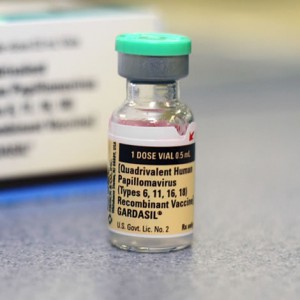 Some conservatives complain about side effects of the vaccine, but the CDC says HPV vaccines, licensed by the Food and Drug Administration, show no serious safety concerns as more than 46 million doses already have been distributed in the U.S.
Some conservatives complain about side effects of the vaccine, but the CDC says HPV vaccines, licensed by the Food and Drug Administration, show no serious safety concerns as more than 46 million doses already have been distributed in the U.S.
One of the major vaccines, Gardasil, was pioneered in Queensland, South Carolina’s sister state.
Former Queensland Premier Peter Beattie noted the vaccine is being used in more than 120 countries “and is saving the lives of thousands of women around the world every day,” he told Statehouse Report. “Anyone interested in saving women’s lives supports the use of the vaccine. Only ignorance opposes its use.”
In South Carolina, the vaccine for students will not be mandatory. Parents can decide whether their children should take it.
A March 2015 Winthrop Poll showed more than two-thirds of South Carolinians supported the proposal to allow DHEC to offer the HPV vaccine to female students entering the seventh grade and explain the vaccine through a brochure.
Advocates emphasize that getting an HPV vaccination, which protects against about 70 percent of the 40 types of HPV, doesn’t encourage sexual promiscuity. Rather, it’s a preventive measure to protect women’s health that simply saves lives and a lot of pain.
According to the Centers for Disease Control, HPV vaccination is recommended for 11- and 12-year-old girls: “It is also recommended for girls and women age 13 through 26 years of age who have not yet been vaccinated or completed the vaccine series. … Ideally females should get the vaccine before they become sexually active and exposed to HPV.”
“We’re educating people on the virus and the availability of a vaccine that can prevent cervical cancer,” noted Rep. Beth Bernstein, the Columbia Democrat pushing the bipartisan measure.
She emphasized that the bill did not mandate giving the vaccine to students, but required “informed consent” of parents. She said Gov. Nikki Haley, who vetoed the measure three years ago over funding, has reportedly said she wouldn’t veto it this year because the program would operate only if funding — generally from federal sources — were available.
The bill now heads to the Senate where chief sponsor Brad Hutto, D-Orangeburg, said a similar version made it through the committee process and is now on the Senate floor for consideration.
“I hope we’ll pass it this year and start saving lives of women in South Carolina,” he said.
Let’s hope the Senate doesn’t get bogged down in a lot of anti-vaccination nonsense and put women’s lives at risk. Approve the HPV bill in short order to help parents understand the importance of the vaccination. If they decide against the protection for their children that the vaccination offers, they can just say no.
This commentary first appeared in Statehouse Report.
Andy Brack is editor and publisher of Charleston Currents. Send feedback to: editor@charlestoncurrents.com.
IN THE SPOTLIGHT
Magnolia Plantation and Gardens
 The public spiritedness of our underwriters allows us to bring Charleston Currents to you at no cost. Today we shine our spotlight on Magnolia Plantation and Gardens, founded in 1676 by the Drayton family. It has survived the centuries and witnessed the history of our nation unfold before it from the American Revolution through the Civil War and beyond. It is the oldest public tourist site in the Lowcountry and the oldest public gardens in America, opening its doors to visitors in 1870. Open 365 days a year, Magnolia offers its visitors splendid tours of nature and history and the role African-Americans played in the development of its award-winning Romantic-style gardens.
The public spiritedness of our underwriters allows us to bring Charleston Currents to you at no cost. Today we shine our spotlight on Magnolia Plantation and Gardens, founded in 1676 by the Drayton family. It has survived the centuries and witnessed the history of our nation unfold before it from the American Revolution through the Civil War and beyond. It is the oldest public tourist site in the Lowcountry and the oldest public gardens in America, opening its doors to visitors in 1870. Open 365 days a year, Magnolia offers its visitors splendid tours of nature and history and the role African-Americans played in the development of its award-winning Romantic-style gardens.
- Visit www.magnoliaplantation.com to learn how you can experience a complete plantation experience.
GOOD NEWS
Dress up, but don’t wear spaghetti
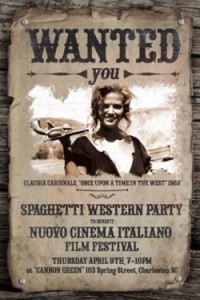 Nuovo Italiano Cinema Film Festival will host a fun spaghetti Western fundraiser April 9 to support the festival that brings contemporary Italian films to Charleston every fall.
Nuovo Italiano Cinema Film Festival will host a fun spaghetti Western fundraiser April 9 to support the festival that brings contemporary Italian films to Charleston every fall.
You’re encouraged to wear Western gear at the April 9 event on Cannon Green, 103 Spring Street in Charleston, and watch a movie classic — C’era Una Volta Il West (Once Upon a Time in the West). Prizes will be awarded for best costume. The event also will feature a silent auction, Italian and Mexican cuisine, and festive music.
“We are looking forward to hosting the community this year at the beautiful Cannon Green with a spaghetti Western fundraiser that will transport our guests back into the days of this famous film genre,” says Giovanna De Luca, the festival’s creative director and an Italian professor at the College of Charleston. “The spaghetti western genre is one that symbolically ties together Italy and America. A derivative of the American western, the spaghetti western is beloved and appreciated in both countries.”
Tickets for the event are $65 before March 27 via College of Charleston online Marketplace, (http://secure.touchnet.com/C20590_ustores/web/), or $75 at the door.
More good news:
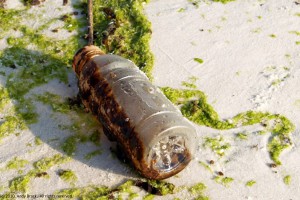
This oil-covered bottle washed up on a Gulf Coast beach after the 2010 Deepwater Horizon tragedy. Photo by Andy Brack
More against drilling. The town of James Island became the state’s seventh community Thursday to pass resolutions opposing offshore drilling and the use of seismic airguns to search for oil and gas deposits offshore. On March 24, the cities of Charleston and Myrtle Beach will consider similar resolutions. In addition to James Island, these coastal communities have passed anti-drilling resolutions: Beaufort, Edisto Island, Folly Beach, Hilton Head Island, Isle of Palms and Port Royal.
- Learn more about the issue in this column by Hamilton Davis in our sister publication, Statehouse Report.
Howdy. A big welcome to bevello, a Raleigh-based women’s boutique that opened Friday on King Street in downtown Charleston. The store, located between H&M and Steve Madden at 285 King Street, will offer a three-hour grand opening starting at 5 p.m. April 9. Customers will get 20 percent off and enjoy free cupcakes, make-up and more. The new location is the chain’s 26th store and third in South Carolina. Says founder and CEO Chan Namgong: “Charleston has everything that I love — great culture, food, art, weather and retail. We cherry-pick our merchandise from the best brands out there. Our buyers do a great job of understanding what our clients want and, of course, our friendly staff is what sets us apart.” More.
Winners. Hats off to David Weintraub’s “Call of the Ancient Mariner,” which won the top prize and best film at the recent 6th annual Terrace Charleston Film Festival. Much of the filming of the movie, which follows the power that sea turtles have had for centuries over mankind, was filmed in the county’s coastal communities. Honorable mention went to “America Street,” by Travis Pearson. Best short film went to “Bills Bad Day,” by Brent Ebell.
Need tax help? Check with your local library for the closest location with free tax help.
Big check. Heritage Trust Federal Credit Union employees held bake sales, had employee luncheon and gave donations to support the March of Dimes. Combined with a sponsorship from the credit union, the organization gave $8,900 recently to the charity.
“We are thrilled to have surpassed our goal for this year,” commented Jim McDaniel, Heritage Trust President/CEO. “This organization touches so many lives throughout the Lowcountry and we are proud to support such a worthy cause.”
Heritage Trust employees will celebrate their fundraising success with thousands of community members at the March of Dimes signature event, the March for Babies on April 25th in Cannon Park.
- For more information about the March for Babies event, any of the services provided by the March of Dimes or how you can participate simply visit marchforbabies.org. To find out more about the March of Dimes in our state, visit www.marchofdimes.org/southcarolina.
FEEDBACK
Enjoyed column about SOB (Sweet Ol’ Bubba)
To the editor:
I enjoyed very much you recalling that my Uncle Bubba (former S.C. Chief Justice Bubba Ness) had the nickname of SOB (Sweet Ol’ Bubba). He told us that when we were kids and we thought it was hilarious.
Over the decades, I have since met many attorneys who believed firmly that Uncle Bubba wasn’t exactly “sweet,” but that the SOB moniker was indeed appropriate.
– Andy Solomon, Charleston, S.C.
If you have an opinion on something we’ve offered or on a subject related to the Lowcountry, please send your letters of 150 words or less to: editor@charlestoncurrents.com | Our feedback policy.
CALENDAR
This week: Bridge Run, Cajun Fest, more
Cooper River Bridge Run: March 28. The 38th annual 10K run/walk from Mount Pleasant to downtown Charleston draws tens of thousands of people. You must be registered to participate. Participants are limited to 38,500. Register.
 Lowcountry Cajun Festival: Noon to 6 p.m., March 29, James Island County Park, James Island. A full day of tunes, food and activities will ensue as the area celebrates all things Cajun. $15 for 13 and up. More.
Lowcountry Cajun Festival: Noon to 6 p.m., March 29, James Island County Park, James Island. A full day of tunes, food and activities will ensue as the area celebrates all things Cajun. $15 for 13 and up. More.
Russian relations: 6 p.m., April 1, Citadel Alumni Center, Charleston. Former U.S. Ambassador to Russia James F. Collins will speak on “U.S. relations with Russia and Eurasia” at an event held by the World Affairs Council of Charleston. More info.
(NEW) Clay Rice silhouettes: 3 p.m. to 6 p.m., April 2, Blue Bicycle Books, 420 King Street, Charleston. Artist Clay Rice will sign books and cut personalized silhouettes at this event. If you’ve never seen Rice’s freehand artistry, it’s something that you can’t miss. Reserve your slot to get a personal silhouette by phoning 843.722.2666.
(NEW) Free Easter weekend events: Freshfields Village near the entrances of Kiawah and Seabrook islands will feature Rubberband from 6 p.m. to 9 p.m. April 3; an Easter festival from 11 a.m. to 3 p.m. April 4 with free children’s activities (including a mechanical bull); and a non-denominational Easter service at 9:30 a.m. April 5 on the Village Green.
Hats On at the Farmers Market: 10:30 a.m. to noon, April 4, Marion Square, Charleston. The Hat Ladies will celebrate opening day of the market and wish everyone at “HaTpy Easter.” More.
Easter Sunrise Service: 6:30 a.m., April 5, Magnolia Plantation and Gardens, Charleston. Old St. Andrew’s Parish Church and St. Andrew’s Mission Church will gather for an Easter Sunrise Service at Magnolia Plantation and Gardens on the banks of the Ashley River. Parking and admission are free. More: Follow #easteratmagnolia on Twitter.
Art on Paper: Through April 5, 2015. While the Gibbes Museum of Art is renovating its space through next year, its third annual Art on Paper exhibit will continue — just in a different location. This year, the exhibition of works on paper will come from six local galleries and be featured at The Vendue, Charleston’s art hotel at 26 Venue Range, Charleston. An opening reception is 5 p.m. to 8 p.m., Feb. 6, at the hotel.
(NEW) CofC spring concert: 7:30 p.m., April 6, Sottille Theatre, 44 George Street, Charleston. The College of Charleston Orchestra will perform its annual spring concert. Yuriy Bekker will conduct the orchestra, featuring renowned cellist Natalia Khouma playing the first movement of Antonin Dvorak’s “New World Symphony” cello concerto. Also on tap is music by student composers. Free to CofC students; $15 for all others.
(NEW) Literary libations: 6 p.m. to 9 p.m., April 14, Mellow Mushroom, 309 King Street, Charleston. Close your book for the night and make a toast to literacy with the Charleston Friends of the Library at a special literary libation fund-raiser and silent auction to support local libraries.
(NEW) Earth Day MUSC: 11 a.m. to 2 p.m., April 15, MUSC Horseshoe, 171 Ashley Ave., Charleston. The 7th annual free education event will feature live music, green food choices and lots of information about composting, rainwater collection, saving energy, reducing waste and becoming more sustainable.
East Coast Paddlesports: April 17-19, James Island County Park. The 25th annual event is one of the nation’s premier showcases of canoeing, kayaking and stand-up paddleboarding. Full event schedule is online.
Fashion Flashback: Through May 10, 2015, 360 Meeting St., Charleston. The Charleston Museum will offer a new fashion exhibition, “Fashion Flashback, 1920s-1960s: Five Decades of Style that Changed America” in its Historic Textiles Gallery. A light-hearted look at 50 years of fashion, viewers will enjoy exploring clothing styles from the swinging 1920s to the hip 1960s. Learn more here.
Natural history exhibit: Through Aug. 10, 2015. “From Land to Sea: 35 Million Years of Whale Evolution” will be featured in The Charleston Museum’s lobby gallery with displays of whale fossils from millions of years ago. There’s limited availability for an overview by Natural History Curator Matthew Gibson on opening night. Learn more.
Bird walks: 8:30 a.m. to noon, every Wednesday and Saturday. This is the time of year that a great variety of migrating birds fly through the Lowcountry so what better time to take part in one of the regular early morning bird walks at Caw Caw Interpretive Center in Ravenel. Pre-registration is suggested. Cost is $5. Walks also are conducted on James Island and Folly Beach. Learn more online.
If you have an event to list on our calendar, please send it to editor@charlestoncurrents.com for consideration. The calendar is updated weekly on Mondays.
MYSTERY PHOTO
A bridge with a view
CLUE: This week, we’re traveling again to a faraway place. Look in the background for a tip. Let us know where you think this bridge is and which bridge it actually is. First correct guess gets a pair of tickets to Magnolia Plantation and Gardens — just in time for the spring tours. Send your guesses — and include your name and hometown — to editor@CharlestonCurrents.com.
 Last week, we ran a photo by Michael Kaynard of an alligator sunning with some turtles on a board.
Last week, we ran a photo by Michael Kaynard of an alligator sunning with some turtles on a board.
“Why that is no doubt Magnolia Plantation and Gardens,” wrote Toni Carrier, a Tampa, Fla., resident who works in Charleston.
She got it right, as did Sara Dwyer of Charleston, who originally guessed Magnolia or Caw Caw Interpretive Center. When pressed for one answer, she guessed Magnolia. Others who guessed correctly were Archie Burkel, James Island; and Joe Mendelsohn, Charleston.
AN INVITATION: If you have a picture that you’d like us to feature as a MYSTERY PHOTO, send it to us, along with your name, hometown and information about the photo (we might not guess its location correctly!).
S.C. ENCYCLOPEDIA
Georgia Harris, Catawba potter
Georgia Harris was born on July 29, 1905, on the Catawba reservation near Rock Hill, the daughter of Chief James Harris and his wife, Margaret. Her maternal grandparents were Martha Jane Harris and Absalom “Epp” Harris. Both were potters of some genius. Martha Jane was one of the most talented potters of the nineteenth century, noted for her large vessels, while Epp Harris was a brilliant pipe maker. Georgia Harris grew up watching these talented family members at work in clay, and she began making pottery seriously around the age of ten.
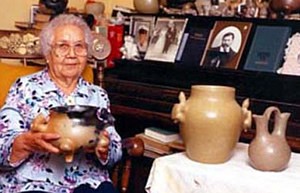
Ms. Harris with some of her pots. More info here.
Harris was educated on the reservation at the Catawba Indian School and at the Cherokee Boarding School. When she reached her full strength as a potter, much of the pottery produced by the Catawba was being sold in the mountains of North Carolina. She was immediately offended by the low prices of from 10¢ to 25¢ offered for each vessel. Shunning rank-and-file merchants, Harris sought out dealers who appreciated her art. After the division of tribal assets under the Termination Program (1961), she saw a chance to develop her mind further. Harris obtained a grant to take training as a licensed practical nurse and studied in Lancaster. When she obtained her license and began working in hospitals around Rock Hill, Harris retired from making pottery.
In 1973, Steve Baker convinced Harris to build pots for a show and sale he was curating for the Columbia Museum of Art. Baker’s proposal sparked her interest. He insisted that Catawba pottery prices were not fair and should be raised. Recalling the insulting prices offered by the North Carolina merchants, Harris agreed and raised her prices to a high of $125. This was an unthinkable move at the time. Nevertheless, the Columbia Museum of Art show was a great success and Harris sold all her vessels. As a result, she returned to pottery making as a means to supplement her retirement income. Her home was immediately sought out by pottery collectors, anthropologists, historians, archaeologists, journalists, and folklorists.
In 1977, at the Spoleto Festival in Charleston, the Countess of Italy bought one of Harris’s Indian head pots for the unheard of price of $350. This sale made the handful of Catawba potters sit up and take notice. Over the next few years, the number of active potters approached fifty, largely due to the efforts of Georgia Harris. Everyone admired her pottery-making skills and her confidence in the value of her work. Harris demonstrated pottery in numerous schools and museums, including the Mint Museum of Charlotte, North Carolina; the Schiele Museum in Gastonia, North Carolina; and the Renwick Gallery at the Smithsonian in Washington, D.C. Over the years she taught pottery making to a large number of Catawba. She was a primary instructor in the innovative class of 1976, the first effort the Catawba made to teach pottery making in a formal classroom. She also taught master potters Nola Harris Campbell and Earl Robbins.
By the time Harris retired a second time from pottery making in 1994, the number of active potters approached seventy-five persons. She died in Dallas, Georgia, on January 30, 1997. Later that same year, Harris became the first posthumous recipient of the Nation’s Folk Heritage Award from the National Endowment for the Arts.
– Excerpted from the entry by Thomas J. Blumer. To read more about this or 2,000 other entries about South Carolina, check out The South Carolina Encyclopedia by USC Press. (Information used by permission.)
OUR UNDERWRITERS
Charleston Currents is an underwriter-supported weekly online journal of good news about the Charleston area and Lowcountry of South Carolina.
To learn more about how your organization or business can benefit, click here to contact us. Or give us a holler on the phone at: 843.670.3996.
SUBSCRIBE FOR FREE
Subscriptions to Charleston Currents are free.
- Click here to subscribe.
- Unsubscribe. We don’t want to lose you as a reader of Charleston Currents, but if you must depart, please click here.



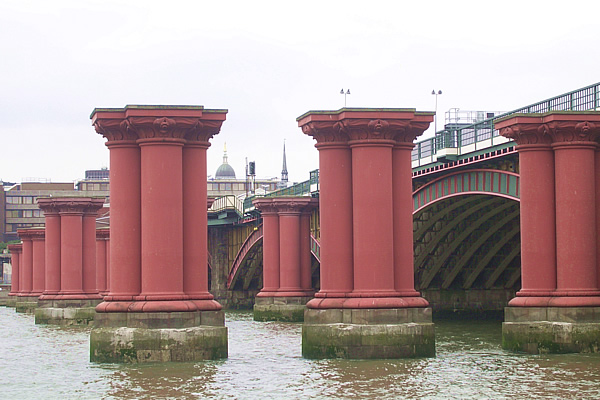

 We Can Do Better, South Carolina!
We Can Do Better, South Carolina!
























